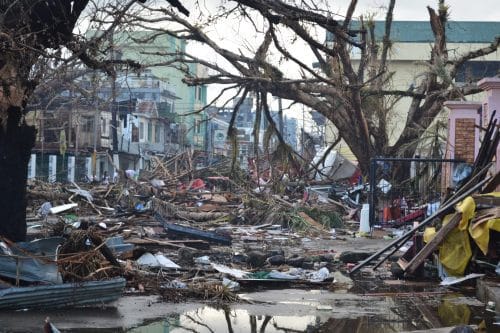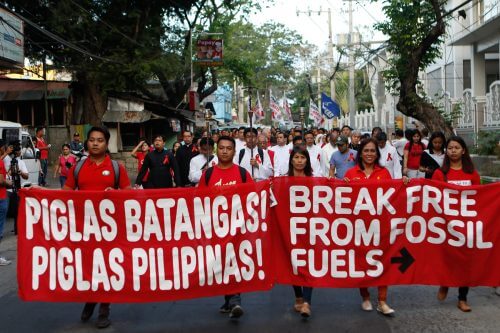A legal proceeding currently taking place in the Philippines seeks to establish that 47 companies are guilty of violating fundamental human rights because of their responsibility for climate change. Is this an effective step, or just a publicity stunt? Two Israeli experts are trying to decide the question
By Shahar Shluh, Zveta, Science and Environment News Agency
At the end of last July, the Philippine government announced that it was giving the 47 "big carbon emitters" a month and a half to respond to accusations of human rights violations. These are international oil, coal, concrete and mining companies, which are claimed to be responsible for climate change due to the high carbon emissions they produce, and therefore also for extreme natural phenomena that have severely affected the population of the Philippines.
The hearing may lead to an unprecedented legal process. The Commission for Human Rights in the Philippines (CHR) sent the companies, among them the oil giants of and BP, a document that accuses them of "violating the fundamental human rights to life, food, water, sanitation, proper housing and existence with dignity". This is a precedent-setting step, the likes of which has never been carried out by any government body in the past.
CHR's main claim is that the 47 companies should be held responsible for the consequences of their greenhouse gas emissions on the Philippines, and that they should explain how the violation of human rights resulting from climate change will be "reduced, corrected and avoided".
Storms and heat waves
There is almost no place in the world that is not affected by climate change, but some places are more vulnerable than others. The Philippine archipelago is undoubtedly one of them. The four most destructive storms the country has known occurred in the last decade and the residents also suffered from floods and extreme heat waves. The typhoon Ian that shook the Philippines in 2013 was one of the deadliest ever recorded: about 6,500 people died during it, more than 1,000 people are still listed as missing and tens of thousands were forced to leave their homes. The initiators of the legal action are the typhoon survivors and tens of thousands of Filipinos expressed public support for it.

The official investigation of the entities' responsibility for the major damage will begin in October 2016, after the 47 companies respond. All companies will be invited to the hearing, but CHR can compel only 10 companies that have offices in the Philippines to participate. This is not just an internal Philippine matter. The list of 47 bodies is related in one way or another to every citizen in the world. The composition of the list is based on research by Richard Hand, head of the Climate Accountability Institute in Colorado, USA. According to Hayd's findings, 90 companies in the world are responsible for almost two-thirds of the greenhouse gas emissions produced since the beginning of the industrial age - and for 22 percent of global emissions in 2013-2010.
Does the procedure initiated by the CHR have an important legal significance? Dr. Tzipi Iser Itzik, head of the environment department at the Lipa Meir & Co. law firm and head of the Center for Environmental Protection at Netanya Academic College, believes that this is not a step that will change the world. "I'm not an expert on the law that applies in the Philippines, but from the publications it appears that this is a procedure that cannot end in a binding decision or a decision with a sanction on its side, because the body that administers the procedure does not have the authority to charge or impose a fine," she says. "Therefore, at most it will be determined that these companies emit greenhouse gases that have the potential to harm people. The procedure is not judicial, but an administrative discussion in nature. Beyond applying public pressure, I don't see how this type of procedure can solve the global climate crisis."
So what can help? "Precisely when it comes to proceedings against commercial companies, there is a great effectiveness to measures that have an economic and business impact", said Itzik. "Effective measures are those that will make companies take responsibility. The CHR does not have the authority to demand financial compensation or to incentivize financially."
Lawsuits against governments
Is this type of procedure likely to resonate because it is a painful human story? "As an eye-catching claim, it is a very beautiful claim, but it is much more difficult to prove it," says Iser Itzik. "Usually when we talk about human rights, we think of the injured child in conflict zones, or of the mother looking for food for her hungry children. Here we are talking, among other things, about companies that supply fuel to cars. People refuel every day and all over the world. These companies are a cog in a very large system, and explaining the violation of human rights in this case is a very complicated matter. If you want to achieve a significant change, you need to find a global solution to reduce dependence on fuel and gas. If there is a legal procedure, then it is better to choose a more effective step, such as administrative lawsuits against governments."
Indeed, this trend of suing governments is also gaining momentum. Last year, lawsuits were filed in Britain against the state, claiming that it does not enforce the air quality policy it itself established and the British court's ruling will bind the entire European Union. Legal battles of a similar type are also underway in the United States - civil environmental organizations such as Our Children's Trust Legally attacking the state on the grounds that it is not doing enough in the climate field to protect the population and future generations. Last year, an administrative lawsuit initiated by Dutch citizens resulted in a precedent-setting ruling by the court in The Hague requiring the Dutch government to reduce carbon emissions by 25 percent within five years.

"It is important to know that even if a legal process fails, it does not mean that the reason why it was opened is not justified," adds Iser Itzik. "Sometimes legal actions, even if they fail, cause a change of mind, but there is also a fear that an unsuccessful legal action will cause more harm than good. Thus, for example, in the case of the lawsuit in the Philippines, a failure may cause people to come to the conclusion, 'If the BP company is not guilty, then of course I have no responsibility as a consumer of polluting fuel.'" Apart from legal activity, civil society has other ways of acting. "The way to influence companies is in the business arena, encouraging the preference of more environmental products, more environmental companies, buying securities of companies that are more environmental, looking at sustainability indicators when making financial investments," says Iser Itzik. "The legal tool is in many cases an effective tool for promoting awareness of the environmental agenda, but in order to promote solutions to global crises, a decision-making process is required in which all the countries of the world participate. International conventions are the solution. From my experience at 'Adam Teva and Din' (Isser Itzik served as CEO of the association, S.S.) petitions to the High Court of Justice increased the awareness of the public and the decision makers, but a solution was reached when laws were eventually enacted. The use of the judicial tool cannot replace legislation or a positive decision-making process."
A clear message to companies
Yossi Kadan, center The investment diversion campaign International in the 350 organization (an international environmental organization whose goal is to ensure that the concentration of carbon particles in the air does not exceed 350 per million air molecules), actually thinks that CHR's move is the right step and that a lawsuit, even if it does not end in victory, may still harm the polluting companies and add to the pressure exerted on them. "Once you are sued, you are considered more at risk, your value accordingly decreases. Investors are aware of the danger in oil and gas companies" says Kadan, who adds that in his opinion the fight should be on all fronts: "Economic war, psychological war, image war. Our economy does not operate in a vacuum. Regulation, policy, subsidies and public opinion are all essential factors in reshaping our economy and, by extension, our climate."
"The move in the legal arena in the Philippines, if it takes place, will likely take many, many years. In the long term, this could mean something if we take as an example the tobacco companies that are still paying for damages they caused," says Kadan. "We cannot wait for the legal result, but there is a clear message here to companies, investors and politicians who are supposed to apply regulations and laws on the subject of energy. It is impossible to be satisfied only with the economic and legal aspects. I think there is a very right step here and I hope that it will convey the message."
And what is the common man supposed to do until then - completely abstain from using vehicles? "We are in a situation where we don't have many choices and that means we have to produce the choices of alternative fuels and alternative energies," says Kadan. "You have to understand that the change is political. It's not enough that you and I decide to go cycling. We need appropriate policies, appropriate subsidies, regulations. These things do not grow in a vacuum. Public pressure is needed, not from protesters, but from investors withdrawing their money and governments accusing companies of exceeding standards. This is what will result in us not having to use only what we are given today. Proving that the polluting companies violate human rights will be a story from the dismissal and it will take many years. It's like the difficulty of proving a connection between an infection and a certain type of cancer, but that's the purely legal aspect. This claim has a public, economic and political value no less than its legal value."
Will other countries follow the Philippines and demand that the leading companies in greenhouse gas emissions take responsibility for human rights violations? "I really hope so. I will be surprised if countries in the Pacific Ocean do not submit similar claims", says Kadan. "Furthermore, communities of people who were affected like the residents of New Orleans who were affected in 2005 by Hurricane Katrina can sue. This is a start. The very fact that there are such lawsuits will hurt those companies. I think one of the ways to deal with them is to make them assigned out of disgust."
Like Iser Itzik, Kadan also thinks that one should not rely on the legal field alone. "I hope that this litigation will end in victory not only in the court of law, but also in the court of public opinion," he says.

2 תגובות
Simple account
Man has eliminated most of the vegetation in the world, so the absorption of PAD by plants no longer has the great effect it once had.
Warming is a measured thing, and there is no debate about the fact that the world is warming.
The emission of PAD by man is a well-known fact. Scientists can calculate how much energy this gas absorbs and what the effect is on the climate.
I'm really sorry that the facts conflict with your agenda. I don't know where you are getting your feed from, but you should look for your information in a reliable place instead of this.
Carbon dioxide is food for plants
The more carbon dioxide there is, the more flourishing the plant in KDA is.
The whole extreme man-made climate change thing
It is a fraud on behalf of the same people who brought millions of immigrants into Europe and the USA
And their ultimate goal is to enslave humanity.